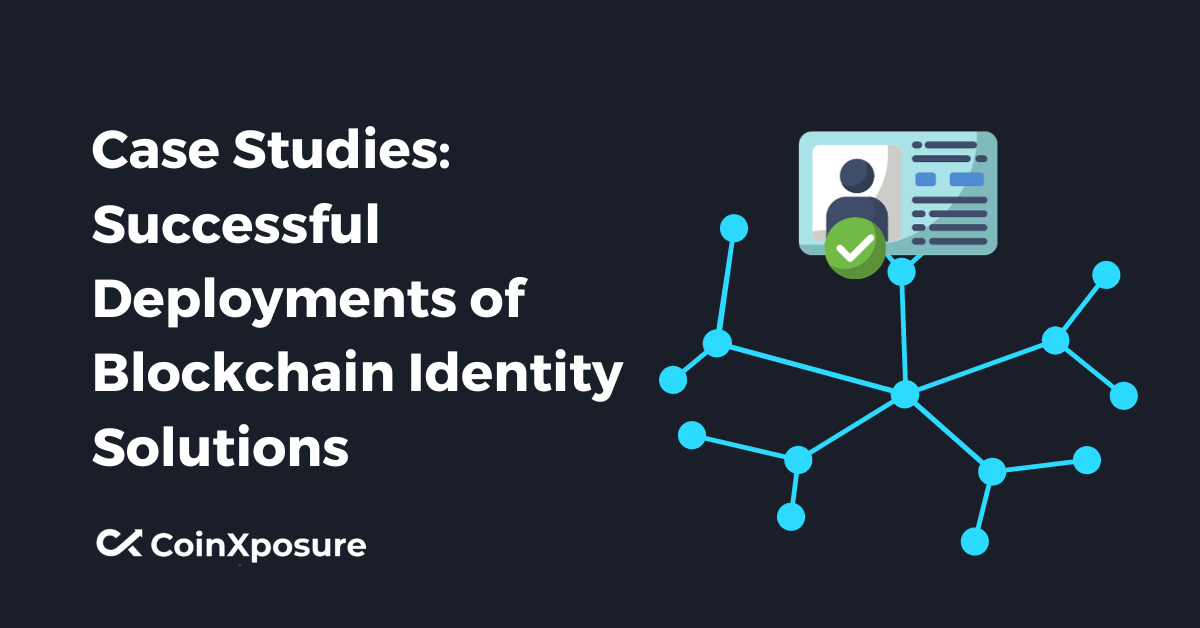
Case Studies – Successful Deployments of Blockchain Identity Solutions
In the rapidly evolving landscape of digital interactions, the need for secure and efficient identity solutions has become paramount. Blockchain technology, renowned for its transparency and immutability, has emerged as a formidable candidate for transforming the realm of identity management.
This collection of case studies delves into successful deployments of blockchain identity solutions, exploring real-world applications that showcase the efficacy of this innovative approach.
From national initiatives to corporate projects, these case studies offer insights into the tangible benefits, challenges faced, and the future potential of integrating blockchain into identity solutions.
Definition of Blockchain Identity Solutions
Blockchain identity solutions refer to the use of blockchain technology in creating, managing, and verifying digital identities in a secure, transparent, and decentralized manner.
These solutions leverage the inherent features of blockchain, such as immutability, transparency, and cryptographic security, to establish trust and reliability in identity management.
By storing identity-related information on a blockchain, individuals gain more control over their personal data, while organizations benefit from enhanced security, reduced fraud, and streamlined verification processes.
Blockchain identity solutions aim to revolutionize traditional identity management systems by providing a decentralized and tamper-resistant foundation for establishing and validating digital identities across various applications and industries.
Case Studies of Successful Deployments of Blockchain Identity Solutions
- Estonia’s e-Residency Program:
- Background: Estonia implemented blockchain for secure digital identities in its e-Residency program.
- Implementation: Leveraging blockchain for authentication and verification, providing users with secure access to digital services.
- Success Metrics: Increased efficiency, reduced bureaucracy, and enhanced trust in digital interactions.
- Microsoft’s Decentralized Identity (DID) Project:
- Initiative: Microsoft’s push for decentralized identity, allowing users to control their digital identities.
- Implementation: Integration of blockchain for identity verification, fostering user-centric identity management.
- User Adoption: Positive reception and increased user empowerment through decentralized identity solutions.
- Sovrin Foundation’s Self-Sovereign Identity (SSI):
- Approach: Sovrin’s focus on self-sovereign identity, putting users in control of their identity information.
- Blockchain Integration: Implementation of blockchain for a decentralized, user-controlled identity ecosystem.
- Global Impact: Application in various industries, promoting privacy, security, and user consent.
- IBM’s Food Trust Network:
- Introduction: IBM’s use of blockchain in the Food Trust Network for supply chain transparency.
- Blockchain in Supply Chain: Utilizing blockchain for verifiable and secure identities in the food supply chain.
- Improvements: Enhanced traceability, reduced fraud, and increased consumer trust in the food industry.
These case studies exemplify the successful integration of blockchain into identity solutions, showcasing diverse applications and the positive impact on efficiency, security, and user empowerment.
Lessons Learned and Challenges
Lessons Learned:
- User Empowerment
- Interoperability
- Regulatory Compliance
User Empowerment
Successful deployments emphasize giving users control over their identities, fostering a sense of ownership and trust.
Interoperability
Ensuring compatibility and interoperability between different blockchain identity systems is crucial for widespread adoption and seamless integration.
Regulatory Compliance
Adhering to regulatory requirements and standards is essential for gaining acceptance and trust in blockchain identity solutions.
Challenges:
- Regulatory Uncertainty
- Privacy Concerns
- Integration Complexity
Regulatory Uncertainty
Navigating the evolving regulatory landscape poses challenges, especially as authorities adapt to the implications of blockchain in identity management.
Privacy Concerns
Balancing the transparency of blockchain with user privacy is a delicate challenge, requiring innovative cryptographic solutions.
Integration Complexity
Integrating blockchain identity solutions with existing systems can be complex, requiring careful planning and potential system overhauls.
Navigating these lessons and challenges is imperative for the continued success and evolution of blockchain identity solutions in diverse real-world applications.
Future Outlook
Emerging Technologies in Identity Solutions:
- Decentralized Identity (DID): Continued advancements in DID technologies, enabling users to control and manage their identities across various platforms securely.
- Zero-Knowledge Proofs: Enhanced privacy through cryptographic techniques like zero-knowledge proofs, allowing verification without revealing sensitive information.
- Integration with AI: Integration of artificial intelligence for advanced identity verification, fraud detection, and personalized user experiences.
Potential Impact on Industries:
- Finance and Banking: Increased security and efficiency in financial transactions, with blockchain identity solutions streamlining KYC (Know Your Customer) processes.
- Healthcare: Improved patient data management, ensuring privacy and interoperability in healthcare systems through blockchain-based identity solutions.
- Supply Chain: Enhanced traceability and transparency in supply chains, reducing fraud and ensuring the authenticity of products.
Ethical and Regulatory Considerations:
- Data Privacy Regulations: Continued evolution of regulations addressing data privacy concerns, influencing the development and implementation of blockchain identity solutions.
- Ethical Use of AI: Stricter guidelines and ethical considerations regarding the integration of AI in identity solutions to prevent misuse and bias.
The future of blockchain identity solutions holds promise for a more secure, user-centric, and interconnected digital landscape. As emerging technologies evolve and industries adapt, the continued collaboration between technological innovation, regulatory frameworks, and ethical considerations will shape the trajectory of blockchain identity solutions.
Conclusion
In conclusion, the successful deployments of blockchain identity solutions showcased in these case studies underscore the transformative potential of this technology in reshaping how we manage and secure digital identities.
From Estonia’s streamlined e-Residency program to Microsoft’s user-centric Decentralized Identity (DID) Project, and Sovrin Foundation’s commitment to self-sovereign identity, each case study highlights the tangible benefits of leveraging blockchain for identity management.
Yet, ethical considerations and the ever-evolving regulatory landscape will play pivotal roles in shaping the trajectory of these solutions. Striking a balance between innovation, privacy, and adherence to ethical standards will be paramount for sustained success.
In essence, the journey of blockchain identity solutions is a dynamic and ongoing one, holding the potential to redefine trust, transparency, and security in our increasingly digital world.
As technology advances and societal needs evolve, the continued exploration, adaptation, and responsible implementation of blockchain identity solutions will undoubtedly contribute to a more secure, inclusive, and user-centric digital future.





